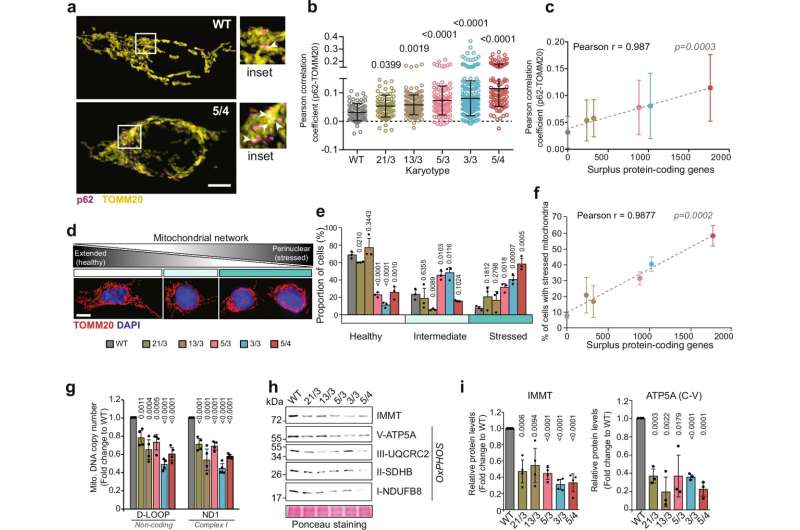It has been known for several years that abnormal chromosome numbers lead to protein imbalances in the affected cells. Researchers at RPTU have now investigated the detailed effects of such imbalances. Surprisingly, they found that imbalanced proteome changes impair mitochondrial function. This, in turn, could be relevant for the drug treatment of cancer. The results are published in the journal Nature Communications.
Every healthy human cell contains 23 pairs of chromosomes, which must be duplicated and distributed evenly between two daughter cells during a process known as cell division. However, if something goes wrong, one daughter cell receives an extra chromosome, while the other daughter cell is missing a chromosome. This condition of an unbalanced chromosome count is called aneuploidy and is particularly common in cancer cells and in cells from patients with Down syndrome.
“Even a single extra chromosome causes many problems for the cell. These include the production of unnecessary proteins from the extra chromosomes, which disrupt the cell’s mechanism for maintaining a healthy protein balance. However, it is not yet clear how all this manifests itself at the molecular level,” explains Professor Zuzana Storchova from the Department of Molecular Genetics at RPTU.
In their recent study, researchers led by Prof. Dr. Zuzana Storchova, head of the Department of Molecular Genetics, and Dr. Prince Saforo Amponsah have deciphered the associated processes in cell lines in more detail. Cell lines derived from the nearly diploid colorectal cancer cell line HCT116 were modified in the laboratory to have one or two additional copies of chromosomes.

The researchers were able to show that cells with additional chromosomes accumulate membrane-less structures called protein aggregates in their cytoplasm. These protein aggregates mainly contain a protein called sequestosome 1 (SQSTM1, also known as p62)—a known receptor that has already been identified in the recycling of proteins and damaged cell organelles.
“We observed that the concentration of this protein was higher in cells with extra chromosomes and that the amount increased with the size of the extra chromosome,” says Prince Saforo Amponsah.
The researchers also found that cells with extra chromosomes have altered mitochondrial structure and function. The reason: mitochondrial precursor proteins are sequestered in p62-positive aggregates, i.e., “confiscated” by them, so to speak, which in turn impairs their passage into the mitochondria.
“Since extra chromosomes are common in cancer, trisomy syndromes, and various other pathological conditions such as aging, our cell lines represent a physiologically relevant model system for investigating the effects of proteome imbalance in human cells,” says Zuzana Storchova, describing the unique features of their research. “Our research reveals a previously unknown link between genomic abnormalities, proteotoxic stress, and mitochondrial homeostasis.”
The conclusion: Although cancer cells have chromosomal abnormalities and exhibit proteome imbalance, they are interestingly able to tolerate proteotoxic stress that is often harmful to normal cells. “Our findings now suggest that cancer cells may alter their mitochondrial metabolism to achieve this,” says Prince Saforo Amponsah. This characteristic could contribute to increased drug resistance in aneuploid cancers. “In the long term, we hope that our research will shed more light on this aspect and contribute to new therapeutic strategies for improving the health of cancer patients.”
More information:
Prince Saforo Amponsah et al, Aneuploidy-induced proteostasis disruption impairs mitochondrial functions and mediates aggregation of mitochondrial precursor proteins through SQSTM1/p62, Nature Communications (2025). DOI: 10.1038/s41467-025-60857-4
Citation:
Chromosome imbalances disrupt mitochondrial function in cancer cells, study finds (2025, June 26)
retrieved 26 June 2025
from https://medicalxpress.com/news/2025-06-chromosome-imbalances-disrupt-mitochondrial-function.html
This document is subject to copyright. Apart from any fair dealing for the purpose of private study or research, no
part may be reproduced without the written permission. The content is provided for information purposes only.

